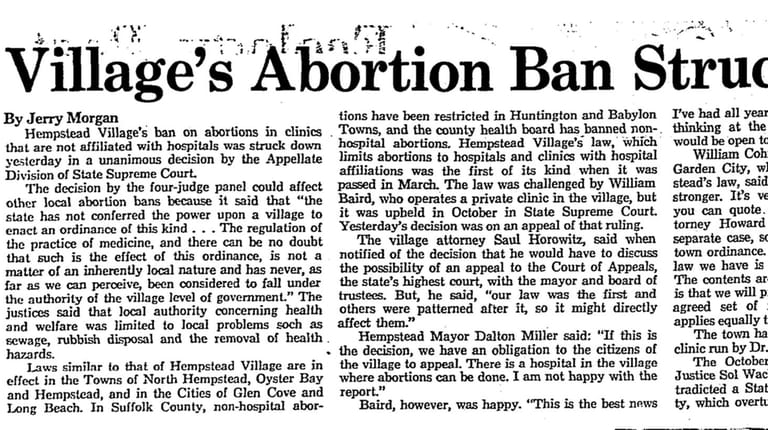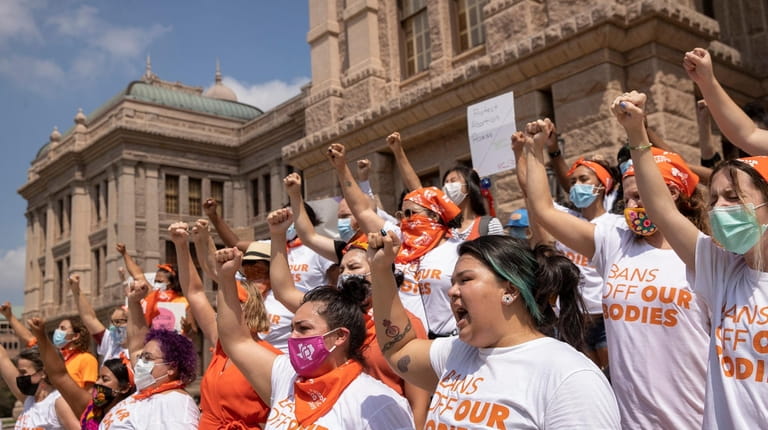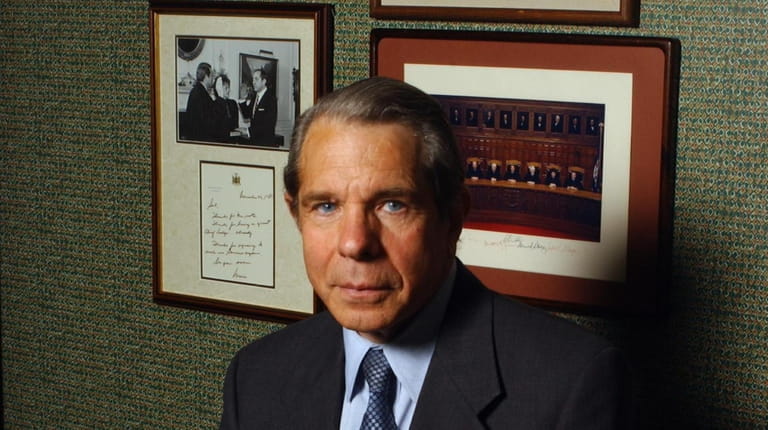Texas abortion law sets scary precedent

Bill Baird, one of the nation's earliest abortion advocates, in front of the fire-charred remains of his Hempstead Birth Control Clinic on Feb. 16, 1979, a day after the building was fire-bombed by an anti-abortion activist. The incident eclipsed Baird's court victory in 1972, when an appellate court reversed Judge Sol Wachtler's ruling upholding Hempstead Village's ban on abortions in clinics unaffiliated to hospitals. Credit: Newsday/Dick Kraus
I never knew my paternal grandmother.
After giving birth to seven children, and for profound personal reasons, she decided to have an abortion. Abortion was criminalized at that time, so she did what too many New York City women did in the 1920s — she induced an abortion using botulism. A doctor was called, but he would not treat her because to do so would have subjected him to a prison sentence of 4 to 20 years. She died, leaving my father and six of his siblings without a mother.
In 1970, three years before Roe v. Wade, New York State decriminalized abortion, adopting the nation’s most liberal law concerning the medical termination of a pregnancy.
Perhaps the thought of my grandmother’s death influenced me when, as a young judge in 1972, I closed down a "storefront" abortion clinic in Hempstead Village, upholding a municipal ordinance that called for the newly legal abortions to be performed "only in hospitals." The fear of many of those who opposed these clinics was that they would not provide for the safety of the patients.
My decision was reversed because, as the appellate courts properly held, state health law preempted local law when it came to determining where, when, how and by whom abortions were to be performed. Unfortunately, the court victory for the clinic operated by Bill Baird, one of the nation's earliest abortion advocates, was eclipsed in 1979 when, after being fitted with bulletproof glass and steel interior doors, it was set afire by an anti-abortion activist.

A Newsday clipping from Feb. 1, 1972, on the appellate court's decision striking down Hemsptead Village's abortion ban on clinics not affiliated to hospitals. Credit: Newsday archives
New York's pioneering law was advanced by Republicans. Gov. Nelson Rockefeller signed the bill, passed by the State Senate and Assembly, also controlled by the GOP. Although abortion was illegal in every other state except Hawaii, some states like California — under Gov. Ronald Reagan, a Republican — enacted similar laws. Even Barry Goldwater, the avatar of Republican conservatism, had favored legislation permitting abortions. In those days, abortion was not a partisan political issue — it was a regional and religious issue which became political when presidential candidate Richard Nixon "personally" joined Terence Cardinal Cooke of New York in efforts to repeal the state's law legalizing abortion. After Roe v. Wade, the determination to overrule that decision became a Republican Party priority and part of the GOP platform.
In Roe v. Wade, a divided Supreme Court held that because the Fourteenth Amendment provided that "no state shall abridge the privileges or immunities of citizens of the United States," it protected a woman’s right to have an abortion during a certain period of time. Chief Justice William Rehnquist, in his dissent in Roe, noted "that the drafters (of the Constitution) did not intend to have the Fourteenth Amendment withdraw from the States the power to legislate with respect to this matter (abortion)." Justice Byron White added: "The Court simply fashions and announces a new constitutional right for pregnant women and, with scarcely any reason or authority for its action, invests that right with sufficient substance to override most existing state abortion statutes." Perhaps Justice White’s prophecy will come true and the Texas "heartbeat law" will be declared unconstitutional, but it is hard to imagine that statute surviving constitutional scrutiny without the court first overruling Roe.
However, up to now, the majority of the court has agreed with the very recent view of Chief Justice John G. Roberts that Roe, like it or not, has become a matter of strong and well-established legal precedent that the courts are bound to follow. In fact, the Supreme Court held in 1992: "An entire generation has come of age free to assume Roe's concept of liberty in defining the capacity of women to act in society, and to make reproductive decisions" and that there is no reason to discard that precedent. But even if Roe is reversed and the abortion issue is again decided by each state, that would be better than having the Texas "heartbeat law" survive.

Women protest the new abortion law at the Capitol in Austin, Texas, on Sept. 1. Credit: AP/Jay Janner
Whether you are pro-life or believe Roe v. Wade was a legal epiphany — whether you are Republican or Democrat — you should be frightened by the implications of the Texas "heartbeat law," which deputizes anyone in the United States to launch a lawsuit against anybody suspected of knowingly aiding or abetting someone attempting to terminate a pregnancy after 6 weeks. "Damages" are assumed to be $10,000, plus attorney’s fees — to be paid by the defendant.
Forget the politics of abortion: What about same-sex or interracial marriages? If a similar statute were passed, anyone knowingly promoting, aiding, or abetting a wedding between same-sex couples or between people of different races — officiating or providing invitations, a wedding cake, or a hotel room — could be sued. Of course, such marriages would be legal, so long as you are willing to pay the $10,000 bounty to the person whom your act offended. All that is needed is a state legislature and governor along with some people who find a particular practice objectionable. Gun owners who prize their Second Amendment rights could be sued civilly for possession of a firearm if their particular state legislature and governor passed a similar bounty law.

Sol Wachtler is former chief judge of the New York State Court of Appeals and adjunct professor at Touro Law School. Credit: Newsday/Tony Jerome
The precedent is compelling, and frightening. Eventually, the Supreme Court will have to determine whether a state legislature can create a civil tort action, as Texas has done, to deprive a person of a constitutionally guaranteed right. So long as the Texas law is deemed valid, those seeking legal abortions, even in cases of rape or incest, will be forced to either find another state which has not passed a "heartbeat law" or, if the need is compelling enough, follow the path taken by my grandmother.
This guest essay reflects the views of Sol Wachtler, former chief judge of the New York State Court of Appeals and adjunct professor at Touro Law School.
